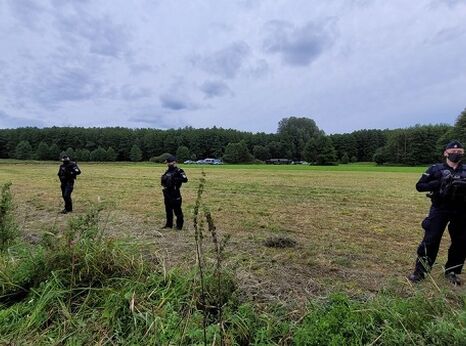Poland: Protect Afghans stranded at Polish border

32 asylum-seekers from Afghanistan have been stranded at the Poland Belarus border for weeks, with limited access to water, food, adequate shelter, and medical care. Belarus and Polish border guards have kept them in a strip of land on the border, in Usnarz Górny, following their pushback from Poland. Among them, there are 27 men, four women and one 15-year-old girl.
Initially, lawyers, organizations, humanitarians, and activists were given access to the group. On 20 August, the asylum-seekers filled in applications for international protection. Lawyers from the Warsaw Bar attempted to assist with the submission of the applications of all 32 Afghans. However, Polish border guards did not allow them to access the territory of Poland. Since 21 August, activists and several members of parliament have been denied regular access to the group and the border guards prevented them from providing humanitarian assistance. On 1 September, the Belarusian Red Cross, in cooperation with the Polish Red Cross, provided humanitarian assistance to the group.
On 24 August, an Amnesty International delegation visited the area and tried to get access to the group of asylum-seekers, but the border guards did not permit it. Amnesty International obtained credible and consistent reports from other sources about the use of force and threats of violence by Polish border guards when pushing the group back to Belarus.
On 25 August, the European Court of Human Rights (ECtHR) issued interim measures and requested Polish authorities to provide the group with food, water, clothing, adequate medical care and, if possible, temporary shelter. By the time of writing, on 2 September, the Polish authorities have failed to fully comply with this order.
In response to the statements of the President of Belarus, Alyaksandr Lukashenka, that he would not stop people crossing the Poland-Belarus border, Polish authorities have rushed to adopt a battery of measures that curtail the right to seek asylum. On 20 August, Poland’s Ministry of Interior issued an order to close its borders to persons entering the country “irregularly” and obliging them to immediately leave the territory of Poland. In August, the Polish government announced changes in two pieces of legislation- the Law on Foreigners and the Law on granting international protection to Foreigners. These changes would make it impossible for people crossing the border irregularly to seek international protection in Poland. On 25 August, soldiers of Poland’s army started building a fence on the border with Belarus. On 31 August, the Polish government requested the President of Poland to declare a state of emergency for 30 days in the regions bordering Belarus, on the grounds of risks posed by the “3,000 attempted border crossings in August”. The declaration of the state of emergency would entail a ban on assemblies, protests, mass events, and cultural events, among others. Amnesty International fears the state of emergency could have a disproportionate impact on human rights and enable further restrictions of the legitimate and vital activities of organizations, journalists, and humanitarian workers, including preventing them from monitoring human rights violations at the border or providing humanitarian assistance to asylum-seekers.
Pushbacks are unlawful under national, international and European law. Article 4 of Protocol no. 4 of the European Convention of Human Rights, to which Poland is a signatory, prohibits collective expulsions. Under EU and international refugee law, Poland must ensure access to territory to those seeking protection and ensure they have access to a fair and effective asylum procedure, in which their individual circumstances and protection needs can be assessed. Article 31 of the Geneva Convention Relating to the Status of Refugees also obliges states to refrain from punishing asylum-seekers for irregular entry.